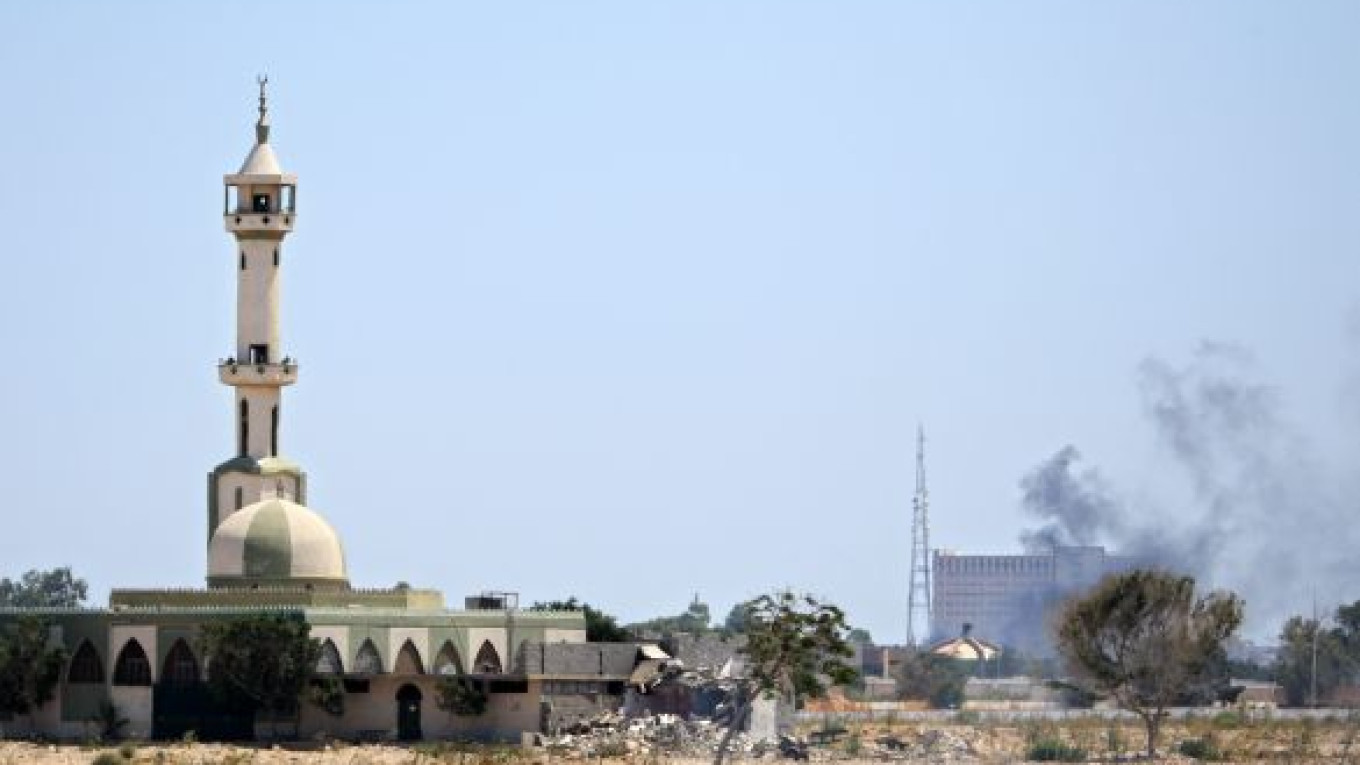While Moammar Gadhafi was somewhere in Tripoli making phone calls to old friends, the situation in the capital remained dangerous and analysts say Moscow's position in the country will be weak if the rebels finally take control.
Reports as of 8 p.m. Tuesday Moscow time indicated that rebel forces had stormed Gadhafi's compound.
Kirsan Ilyumzhinov, head of the World Chess Federation and eccentric former leader of Kalmykia, said Tuesday that he spoke with Gadhafi by telephone and the leader remains in Tripoli and defiant.
Ilyumzhinov's trip to Tripoli in June was among the last times the Libyan leader was seen in public.
Ilyumzhinov said in an interview with Interfax that Gadhafi called him at around 6 p.m. Moscow time on Tuesday and said he was "alive and well and still in Tripoli."
Gadhafi's voice was calm, he spoke in Arabic and his son Mohammed, Libya's Olympic chief, translated his words into English, Ilyumzhinov said.
The phone call was brief, not much more than a minute, and Gadhafi promised to call again later.
Meanwhile, NATO said Tuesday that the situation in Tripoli remained very dangerous and the alliance would continue its operations over the country, bombing forces loyal to Gadhafi if they keep fighting.
But spokesman Roland Lavoie told reporters that pro-Gadhafi forces are losing strength through desertions and defections.
"Our military mission has not changed. It remains to protect the civilian population, enforce the no-fly zone and the arms embargo," he said. "We will conduct strikes wherever necessary to protect the population of Libya."
Rebels and pro-regime troops were fighting street battles in several parts of Tripoli as of Tuesday afternoon, a day after opposition fighters swept into the capital with relative ease.
Russian observers are now analyzing the military and commercial aspects of the situation.
Colonel Viktor Murakhovsky said the likely victory of the rebels was made possible by the West's coordinated efforts. He said a key role was played by intelligence services in buying out or influencing the defections of officials and soldiers formerly loyal to Gadhafi. The training of the rebels by Western advisers and the methodical isolation of the regime were also factors, he said.
The operation in Libya also showed the weaknesses of European warplanes, which could not act independently of the United States, Murakhovsky said.
Mikhail Margelov, President Dmitry Medvedev's special representative to Africa, said the rebels have promised to preserve and reconfirm all existing contracts with Russia.
But the new authorities will not forget that Russia abstained from voting on Resolution 1973 that authorized the no-fly zone, said Vladimir Isayev, an analyst with the Institute for Oriental Studies at the Russian Academy of Sciences. France and Britain will get the economic advantages, he predicted.
The rebels have also indicated that they might revisit contracts.
"We have a few political questions to Russia, China and Brazil," said Abdeldzhalil Mayuf, a spokesman for The Arabian Gulf Oil Company, or AGOCO, Libya's state oil firm now under rebel control. Gazpromneft and Tatneft were actively working in Libya.
AGOCO said Monday that it might resume oil production at two fields in the east of the country within two weeks after a four-month suspension because of the fighting.
"As soon as we see that things have calmed down, we could start production again at the Messla and Sarir fields within two weeks," said Hassan Bolifa, a company manager.
The pipeline connecting the two fields to the export port of Tobruk was not damaged in the six-month battle between Gadhafi's forces and rebels seeking his ouster, Bolilfa said.
The National Transitional Council, the Benghazi-based governing body that represents the rebels, is in talks with foreign oil companies over returning after the conflict forced them to leave, Bolifa said.
A spokesman for Russian Railways, which has a contract from 2008 to build a 550-kilometer high-speed rail link in Libya between Sirt and Benghazi, said the company was planning to start work on the project as soon as the situation in the country stabilizes.
During the recent MAKS air show, Anatoly Isaikin, the general director of Rosoboronexport, said the UN sanctions have cost the arms exporter $4 billion.
The Tactical Missiles Corp. based in Korolyov outside Moscow suffered 600 million euros worth of damage from a blocked air-based missile contract with Libya, Boris Obnosov, the company's general director, said last week.
A contract for six Yak-130 trainer aircraft was frozen, said Irkut Corporation president Alexei Fyodorov.
The big winner will be France, which can now export its Rafale fighter to Libya, said Konstantin Makiyenko, an analyst with the Center for Analysis of Strategies and Technologies.
President Dmitry Medvedev is not expected to get any benefits out of his support of Western allies in Libya. Although he strengthened his international position by supporting sanctions against Libya, most Russians support Gadhafi, said political analyst Boris Makarenko.
(MT, AP, Vedomosti, Bloomberg, Reuters, Interfax)
A Message from The Moscow Times:
Dear readers,
We are facing unprecedented challenges. Russia's Prosecutor General's Office has designated The Moscow Times as an "undesirable" organization, criminalizing our work and putting our staff at risk of prosecution. This follows our earlier unjust labeling as a "foreign agent."
These actions are direct attempts to silence independent journalism in Russia. The authorities claim our work "discredits the decisions of the Russian leadership." We see things differently: we strive to provide accurate, unbiased reporting on Russia.
We, the journalists of The Moscow Times, refuse to be silenced. But to continue our work, we need your help.
Your support, no matter how small, makes a world of difference. If you can, please support us monthly starting from just $2. It's quick to set up, and every contribution makes a significant impact.
By supporting The Moscow Times, you're defending open, independent journalism in the face of repression. Thank you for standing with us.
Remind me later.


